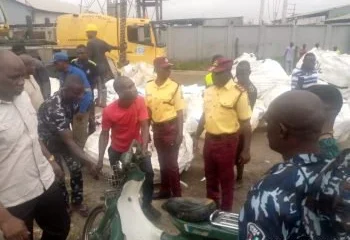Petrol Price Update
Tanker Drivers in Turmoil: How Fake PTD Leaders Threaten Nigeria’s Fuel Supply and Road Safety

The highways that carry Nigeria’s lifeblood petroleum products are facing an invisible but dangerous threat. It is not just potholes, dilapidated roads, or reckless driving.
Also Read: Dangote Slams NUPENG Over ₦50,000 Hidden Levies Per Truck, Says Charges Worsen Fuel Prices
This time, it is a leadership crisis within the Petroleum Tanker Drivers (PTD) branch of NUPENG, where accusations of impersonation, power tussles, and intimidation now threaten to spill from union offices straight onto Nigeria’s highways.
At the heart of the crisis is a bitter dispute: Who truly leads the PTD, the union of men and women who risk their lives daily transporting petrol, diesel, and kerosene across some of the world’s most treacherous roads?
A Court Battle Becomes a Highway Battle
In 2023, the National Industrial Court nullified the election of a faction led by Lucky Osesua, declaring it illegal. A new Special Delegates Conference was held in Ibadan, producing Augustine Egbon as the recognized leader.
Yet despite the ruling, reports of “impostors” parading themselves as PTD elders and leaders have refused to die down. These shadow groups, NUPENG says, are issuing statements, making threats, and in some cases posing as representatives of tanker drivers.
This fight over legitimacy has now grown into something bigger: an existential crisis that could destabilize Nigeria’s fragile fuel supply chain.
Tanker Drivers Caught in the Middle
For the average tanker driver, this leadership tussle is more than politics, it’s survival. Drivers report being pressured to sign loyalty forms, pay allegiance to factions, or face exclusion from jobs. Some claim intimidation and harassment at depots where loading is already chaotic and unsafe.
“We just want to work and feed our families, but every day somebody is claiming to be our leader,” a tanker driver at Apapa depot told RoadKing.ng. “They threaten us to join one group or another. If we refuse, we lose our place on the loading line.”
The loading line he speaks of is not just a workplace queue. It is the start of journeys that stretch for hundreds of kilometers, journeys that often end in accidents, fires, and deaths. Leadership instability makes these dangerous trips even riskier.
How Fake Leadership Can Crash the Roads
- Fuel Scarcity & Panic Buying
Conflicting orders from rival groups can lead to sudden strikes, or the spread of fake news about tanker shutdowns. Each time this happens, motorists rush to petrol stations, clogging roads and sparking panic. - Unsafe Driving Practices
When scarcity looms, drivers are forced into round-the-clock trips. Fatigue, overspeeding, and reckless driving multiply, leading to tanker crashes that devastate highways. - Escalation to Violence
Union fights are rarely bloodless. Clashes at depots or on convoy routes can spill onto the roads, leaving commuters caught in violent blockades. In some cases, rival groups have been arrested for attacks during these disputes. - Loss of Trust
Nigerians already mistrust the petroleum distribution system. Impostor leaders add confusion, leaving the public vulnerable to rumors that can paralyze entire cities.
The Road Safety Fallout
Nigeria records thousands of tanker-related accidents every year, according to the Federal Road Safety Corps (FRSC). When leadership disputes undermine safety protocols, the casualty figures climb higher.
The FRSC itself has warned that fractured leadership makes it harder to enforce safety compliance such as mandatory speed limiters, safety valves, and rest breaks. Without a unified PTD leadership, regulations are harder to monitor and the highways become deadlier.
Government Caught in the Crossfire
NUPENG has formally petitioned the federal government not to recognize the “fake elders.” The union insists only the Ibadan-elected executives led by Augustine Egbon have legitimacy.
But factions are lobbying politicians and security agencies for recognition, creating confusion even at official levels. For a sector as sensitive as fuel distribution, mixed signals from the government could be catastrophic.
Every day that passes without clarity raises the stakes: another false strike warning, another tanker fire, another community scarred.
RoadKing.ng Analysis
The PTD crisis is more than a union squabble. It is a direct threat to Nigeria’s fuel lifeline. Tanker drivers power the economy, carrying petrol to factories, diesel to farms, and kerosene to households. Without them, the nation grinds to a halt.
The impersonation and power struggle must be urgently resolved not just to protect union democracy, but to keep Nigeria’s roads safe. When tanker drivers are divided, Nigeria’s highways bleed.























